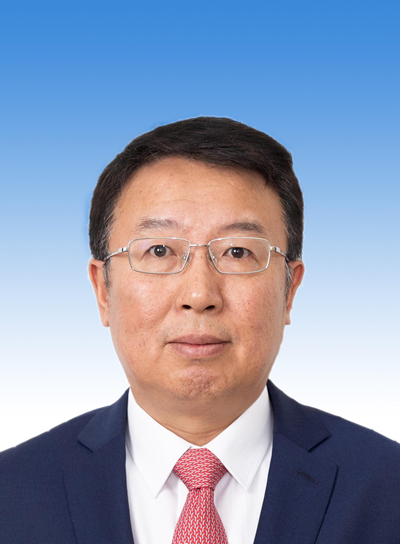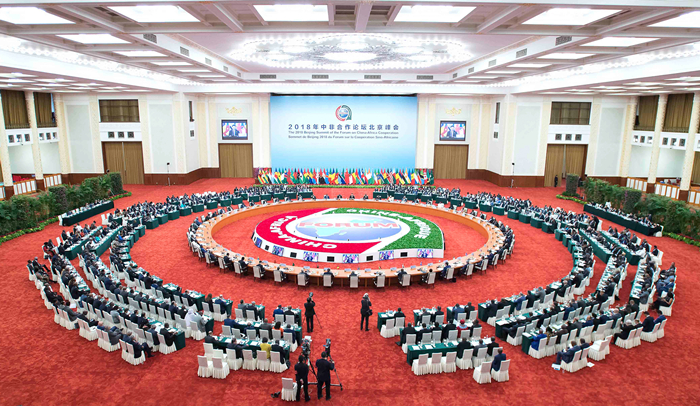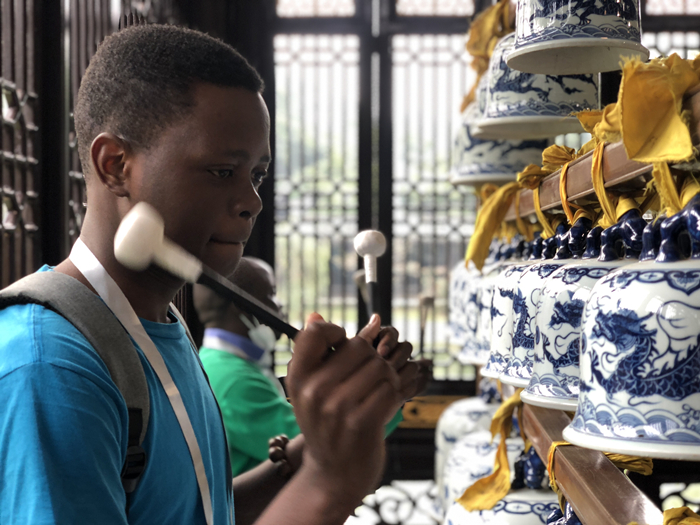|
||||||||||
| Home Nation World Business Opinion Lifestyle ChinAfrica Multimedia Columnists Documents Special Reports |
|
||||||||||
| Home Nation World Business Opinion Lifestyle ChinAfrica Multimedia Columnists Documents Special Reports |
| ChinAfrica |
| FOCAC boosts the comprehensive strategic and cooperative partnership between China and Africa |
| Interview with the Secretary General of the Chinese Follow-up Committee of FOCAC |
| VOL. 13 NOVEMBER 2021 ·2021-11-03 |

This year marks the 21st anniversary of the establishment of the mechanism of the Forum on China-Africa Cooperation (FOCAC). Later this year, a FOCAC meeting will be held in Senegal. Before the meeting, Wu Peng, Secretary General of the Chinese Follow-up Committee of FOCAC and Director General of the Department of African Affairs of the Chinese Foreign Ministry, gave an interview with ChinAfrica, sharing his views on the implementation of the outcomes of the FOCAC Beijing Summit in 2018, expectations of the upcoming meeting, and future cooperation between China and Africa. An edited excerpt of the interview follows:
ChinAfrica: What efforts has China made to implement the decisions of the FOCAC Beijing Summit in 2018 and what are the results?
Wu Peng: The FOCAC Beijing Summit in 2018 is a milestone in the history of China-Africa relations. After the summit, China and Africa have worked together to implement the outcomes. Although the sudden outbreak of the pandemic disrupted the pace of China-Africa cooperation, it has not shaken the confidence of both sides in strengthening cooperation. We are proceeding in two ways to maintain a strong momentum.
On the one hand, we are jointly fighting COVID-19. The successful holding of the Extraordinary China-Africa Summit on Solidarity against COVID-19 has demonstrated the firm resolve and confidence of China and Africa in fighting the pandemic together.
During the difficult period of China's fight against the epidemic, an African student in Foshan, Guangdong Province, left a note and 500 yuan ($78.2) at a police station, saying "I love China" in Chinese. The main idea of the note was that I donate all I have in the hope of saving more lives, and this is my support for China's fight against the epidemic. This story is an epitome of African people's support to China in various forms. The support is sincere and China will never forget it.
After the COVID-19 outbreak in Africa, China took the lead in providing assistance, sending medical experts to 15 countries, cooperating with 43 hospitals in 38 African countries, and providing anti-pandemic materials to all African members of FOCAC. China has also delivered vaccines to more than 50 countries and the African Union through aid and commercial exports, which was widely praised by African countries.

The roundtable meeting of the 2018 Beijing Summit of the FOCAC is held at the Great Hall of the People in Beijing on September 4, 2018 (XINHUA)
On the other hand, we are advancing cooperation despite difficulties. Under the pandemic situation, the two sides have focused their cooperation on health, resumption of work and improvement of people's livelihoods. Since the Beijing Summit, China and Africa have successfully held important events such as the China-Africa Economic and Trade Expo. The China-Africa Institute, the China-Africa Environmental Cooperation Center and 14 Luban workshops have been launched.
In spite of difficulties, a large number of Chinese staff have stayed at their posts or made trips to Africa to ensure that more than 1,100 cooperation projects continue uninterruptedly.
From January to July this year, China-Africa trade volume and China's direct investment in Africa have both bucked the trend and increased. Trade has reached $139.1 billion with a year-on-year increase of 40.5 percent, and Chinese direct investment in Africa reached $2.96 billion, exceeding the level of the same period in 2019 before the pandemic. China has remained Africa's largest trading partner for 12 consecutive years and is the second-largest export destination for African agricultural products.
The African countries have expressed satisfaction with the implementation of the outcomes of the Beijing Summit and the Extraordinary China-Africa Summit on Solidarity against COVID-19 and believe that such achievements were not easy to make under the adverse situation. This also fully demonstrates that China-Africa cooperation is not only pragmatic and efficient, but also resilient, which gives both sides more confidence to overcome difficulties and push China-Africa relations to a new level.
What are your expectations of the upcoming FOCAC meeting that will be held in Senegal?
The Eighth Ministerial Conference of FOCAC will be held in Dakar, Senegal, soon, which will chart a new direction for China-Africa cooperation in the next three years and beyond, and inject new vitality into the development of China-Africa relations. The two sides are working closely to integrate more new initiatives for practical cooperation into the outcomes of the meeting.
In terms of cooperation, we will adopt measures in such key areas as health, investment and trade, food security, climate change, human resources and digital innovation, with a focus on transforming and upgrading China-Africa cooperation to improve its quality and efficiency.
Some work has already been carried out. For example, the China-Africa Digital Innovation Partnership Program was proposed recently. China and Africa have since co-organized an e-commerce promotion season for African products to help African products enter the Chinese market. This will enable Chinese consumers to buy quality African goods at a better price, expand China's imports from Africa, and help Africa recover from the pandemic. It is a multi-benefit initiative that is highly appreciated by the African side. It is believed that the new initiatives of the upcoming conference will unleash more potential of China-Africa cooperation.
Private enterprises will play a greater role in the future. At present, private enterprises account for 90 percent of the number of Chinese companies in Africa and about 70 percent of total Chinese enterprises' direct investment in Africa. Companies such as Huawei and Transsion are well-known in Africa. The next conference will open up a broader space for the development of private enterprises in Africa. It is hoped that private enterprises will adapt to the new development situation of China-Africa cooperation, give full play to their competitive advantages, and contribute more wisdom and strength to deepening China-Africa cooperation and promoting Africa's economic and social development.
What role does the FOCAC mechanism play in promoting exchanges and cooperation between China and Africa?
Over the past 21 years, guided and advanced by FOCAC, the development of China-Africa relations has shown the following characteristics:
First, political mutual trust has been deepened. China-Africa relations have gone through periods to become a comprehensive strategic and cooperative partnership. China and Africa have agreed to work together to build an even closer China-Africa community with a shared future, setting a model for promoting the building of a community with a shared future for humanity. Since the 18th National Congress of the Communist Party of China in 2012, Chinese President Xi Jinping has paid four visits to Africa, and it has been a tradition that Chinese foreign ministers choose Africa for their first overseas visit every year. Those visits have laid a solid political foundation for the development of China-Africa relations.
Second, practical cooperation has yielded fruitful results. Compared with 2000, China's trade volume and investment stock with Africa have increased 20 times and 100 times respectively. Forty-six African countries and the African Union Commission have signed Belt and Road cooperation agreements with China. More than 3,800 Chinese enterprises have invested in African countries, and dozens of China-Africa economic and trade cooperation zones and industrial parks have been established.
Africa is China's second-largest source of crude oil imports, with crude oil imports from Angola alone accounting for 20 percent of China's total imports. Africa is also China's second-largest overseas engineering contracting market. According to incomplete statistics, China has completed more than $570 billion of engineering contracts in Africa. A recently released report points out that the total stock of Chinese enterprises' direct investment in Africa should be no less than $56 billion. Africa has become an important part of China's further opening up and intensifying global economic linkages.

African youth in China experience ceramic culture in Jingdezhen China Ceramic Museum on October 28, 2020 (XINHUA)
Third, people-to-people contact is robust. Important exchange mechanisms and platforms have been established. China has set up a number of cultural centers and established 61 Confucius Institutes and 48 Confucius Classrooms in Africa. China has sent 21,000 medical team members to 48 countries in Africa and treated 220 million African patients in total. Thirty-four African countries have become destinations for Chinese outbound tourism groups. A total of 150 pairs of sister cities have been established. Mutual understanding between the two peoples has deepened and the traditional friendship has been carried forward.
What are the difficulties and challenges in China-Africa cooperation, and how do you see the prospects of cooperation?
At present, both Chinese and African economies are facing challenges due to the intertwined effects of the pandemic and the changes of the international situation unseen in a century. Africa has rising expectations of deepening China-Africa cooperation. Coupled with the interference of external factors, China-Africa cooperation can be compared to rowing in midstream, where not advancing means dropping back.
For China, it has been more difficult for Chinese companies to implement projects in Africa under the pandemic. Some of them are more interested in big projects and pay less attention to small livelihood projects, and their willingness to go abroad is reduced. Some enterprises lack international operation experience, and some of them or individuals have committed illegal acts, damaging China's image.
For African countries, traditional and non-traditional security threats, economic and social development pressure and debt problems have increased. The African Development Bank predicted that after suffering the worst recession in nearly half a century in 2020, it's hard for Africa to step out of the negative impact of the pandemic in a short time, though the economy has started to recover in 2021. There is a long way to go to achieve sustainable development goals.
Although China-Africa relations are in a critical period, cooperation between the two sides is still full of opportunities with bright prospects, based on traditional friendship, solid cooperation foundation and strong mechanisms.
On the one hand, China and Africa have both entered a new stage of development, and their economies are more complementary. China is accelerating the construction of a new development pattern and is committed to expanding its opening up to the world. The African Continental Free Trade Area has been officially launched this year, which is expected to stimulate the potential of a market with a population of 1.3 billion and a total economic volume of $3.4 trillion and inject new momentum into Africa's economic development. There will be more opportunities for mutually beneficial cooperation.
On the other hand, the rise of a new round of technological and industrial reforms has brought new opportunities for deepening China-Africa cooperation. Currently, China-Africa cooperation is showing a good momentum of transition from being government-led to market-driven, from commodity trade to capacity cooperation, and from engineering contracting to investment. The pandemic has catalyzed cooperation within Africa and between China and Africa in areas such as health, 5G, digital economy, and industrial chain and supply chain integration. It has created good environment for China-Africa cooperation, and the momentum of transformation and upgrade of China-Africa cooperation will become stronger.
China's confidence in strengthening cooperation with Africa will not be shaken, its direction will not be changed, and its actions will not be weakened. China will continue to adhere to the principles of sincerity, practical results, affinity and good faith and uphold the correct concept of righteousness and interests. Together with the African friends, China will properly respond to all challenges to bilateral cooperation and promote China-Africa cooperation to keep pace with the times, so as to inject vitality into bilateral cooperation and benefit Chinese and African people with tangible results.
(Print Edition Title: Overcoming Difficulties, Advancing Cooperation)
Comments to likzh@chinafrica.cn
| About Us | Contact Us | Advertise with Us | Subscribe |
| Copyright Beijing Review All rights reserved 京ICP备08005356号-5 京公网安备110102005860号 |